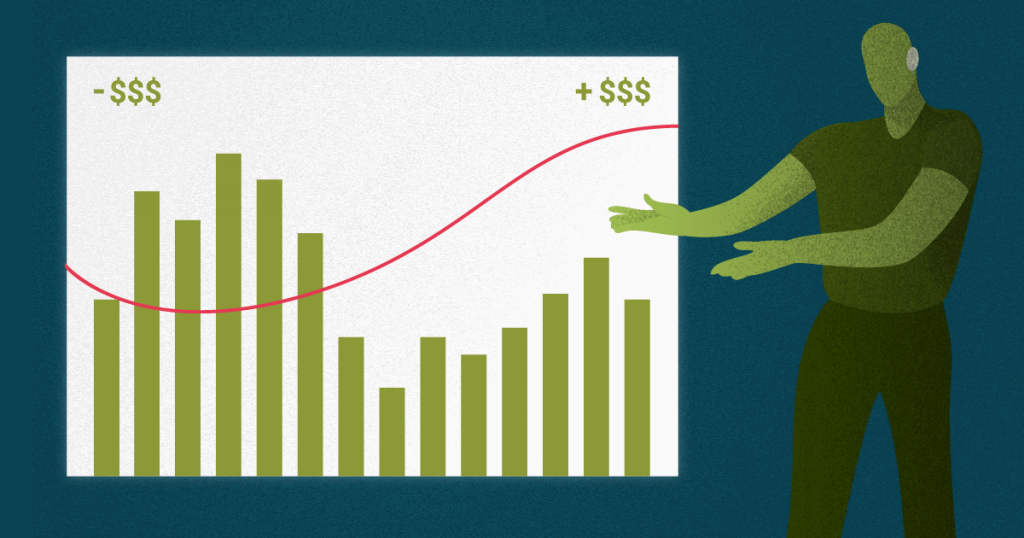Digital Marketing and sales are usually focused on promoting a brand or product so that it organically attracts leads and creates sales opportunities.
But there are some niches, like B2B, in which the opportunity needs to be directly engaged by these professionals — a one-on-one effort to show why it is worth closing the deal with you and not your competitors.
Value-based sales are the best approach for this scenario. In this article, we show you why it is important to get closer to the prospects when you want to aggregate value to a product/service. You’ll see the following:
- What is a value-based sale?
- What are the benefits of value-based sales?
- What do you need to do to add more value to your sales?
What is a value-based sale?
When customers buy a product, they usually do all the research, comparison, and consideration by themselves. What is the best phone, the best sneakers, and so on.
But some products and services are not only for consumption but tools for the client to empower their own business.
That is why B2B selling requires a completely different approach from B2C.
Having the best price, or the hippest design, won’t be enough to close deals. There is a lot of money invested in those products, and customers want to be sure the return is worth it.
This is what value-based sales are all about. It is a selling method that focuses not on the solution itself, but on how it can benefit the customer’s life or business.
It is an effort to bring up benefits and projections at every interaction and creating arguments on how your product is the best to solve their demands.
As the name says, you don’t sell the product itself, but its value to the client.
This approach requires a lot more proximity between Marketing and Sales personnel and the prospects they are trying to convert.
It means emphatic, emphasized connection with the root of their problems and how a solution could be the perfect response to meet their expectations.
Yes, it takes longer and requires more from these departments. But in negotiations with a higher average ticket, as it is common in B2B, you need that extra push to be successful.
What are the benefits of value-based sales?
Even in B2B, you can use many B2C methods for marketing automation and nurturing a funnel. These strategies are all still on the table.
But what differentiates value-based sales is how close you get to the clients you want to convert and what that means to a brand’s image.
Let’s see the main benefits that come from this effort!
The conversion rate increases
When you have a product/service aimed at business clients, it is way smarter to focus your lead generation on quality than quantity. And if you have fewer prospects to work with, you need to convert as many as you can.
Value-based sales is a strategy that puts you closer to your clients. You get to know them more, have more frequent contact, and have more time to learn and teach.
Having such meaningful interactions gives you more opportunities to find and deliver the right topics to convince them. It’s more like a classic salesman approach. You can use this power to raise your conversion rates.
Prices can increase
When your solution to a prospective client’s need shows real value, you can charge more for it. That’s exactly the main point behind value-based sales.
The work of the Marketing and Sales departments is not only to present specs and benefits but also the return a product can potentially have in the specific case of each client.
Customized solutions and closer relationships bring value to a purchase. And more value always means more profit.
The target audience becomes more predictable
A positive side-effect of investing in value-based sales is the data you gather from these frequent, meaningful interactions with your prospects.
You get to know your target audience more: what are their most common difficulties, what they expect from solutions, what is the desired effect of a new product in their routine.
All you learn from each customer is new information to convert the next. With time, the brand itself has its aura of authority and expertise, with professionals who’ve seen a lot and can better help the buyer persona in a more timely manner than the competition.
Customer loyalty gets easier
A value-based sale only happens when there’s a true connection between you and your client. You need to convince them with a good-faith argument that the product is the best solution for them.
So, if the deal is closed only when gaining their trust, you are way closer to keep them loyal to a product or brand.
You just need to keep nurturing the same relationship after conversion, and the chances are they will keep investing in you.
The brand’s trust brings more costumers
We just talked about how showing real value is the key to satisfying B2B and similar customers. You aren’t selling only a product, but the return on that product. The experience it brings after purchase.
When done correctly, the brand becomes trustworthy and a reference for the market.
With more recommendations and successful cases, new leads come to you more open for that relationship and pay more for your solution. It is a virtuous circle to keep that brand growing.
What do you need to do to add more value to your sales?
Now that you know the why, let’s talk about how. Most steps for value-based sales are focused on relationship and proximity.
Here is how they should be included in your efforts.
Know who you are selling to
Knowing a buyer persona is a key factor for conversion in any marketing strategy — that is a fact. But some particularities make this even more important when selling value.
You need to know more than difficulties, demands, and expectations. If you’re in B2B, for example, you need to learn about your client’s business: how it works, what kind of public they have, what are the trends in their market, how they do marketing, etc.
This way, you can always find the best arguments to link their projections of the future to your product. When you show you are concerned about their future, they will want to make you part of it.
Don’t hasten the conversion process
When you know more about prospective customer demands, it is tempting to go directly to the sales pitch. But if you want to nurture an enduring, strong relationship, wait until it becomes a real two-way street.
So listen first, talk later. Even if it is redundant, even if you already know where the conversation is going, let them take the time to explain the problem and the expected solution.
It is a gesture to build trust, to show you care, and an opportunity to gather some specific details that can strengthen your arguments.
Always focus on a specific value, not general
Speaking of particularities, have in mind that each customer values things differently. This is a key point for value-based sales.
So try to distance your product from generic, vague statements. What these clients want to hear is how they will specifically work in their case.
The customer’s business/routine/demand is always the starting point for each argument, not your solution.
That way, they perceive your intent to help and see the real-world value the product gives them in return for their investment.
Make it a partnership and teach your customer
We are saying a lot here that a value-based sale is more akin to becoming a partner than a simple business-customer interaction.
Use all the knowledge you have in the area to teach instead of selling. Show them why they are having problems and how your solution works in that scenario. Give examples, make projections, compare KPI’s.
That’s how you build authority and beat the competition even at higher prices. These kinds of customers don’t think only about saving. They want real solutions.
Bring value to every engagement
Value-based sales indeed require more time and engagement, but it doesn’t mean these prospects will tolerate padding and irrelevant meetings.
So try to build a strategic and objective relationship. Plan your interactions to always bring useful information, better conditions, new data, and arguments.
A specific CRM for this strategy can help you optimize the process and convert more.
Be honest and qualify out if needed
Value-based sales are all about trust. As we said, one of its benefits is how being interested in your prospect’s demands shows them you care more and can deliver more than the competition.
You have the know-how, you have the expertise, and you have the data. If you feel your solution isn’t the best in some specific cases, tell that to your potential clients.
Even if this results in one customer leaving, it will help build a solid image as a trustworthy, customer-centric brand.
If you want to help a brand or product to sell more in demanding markets — while raising the average ticket — value-based sales are the perfect approach.
Demonstrate that you care about your audience, and you want to be part of their success!
And speaking of prices, do you want to know more about how to beat the competition and increase sales? Come see our special post about competitive pricing strategy!







